Analysis and Comparison of International Digital Competence Frameworks for Education
Abstract
:1. Introduction
2. Literature Review
- (a)
- The text should be fully available for download.
- (b)
- The comparison should include more than two frameworks (as we are not interested in one-to-one but in broader group comparisons).
3. The Semantic Field of Digital Competence
Digital literacy is the set of knowledge, skills, attitudes, and values that enable children to confidently and autonomously play, learn, socialize, prepare for work and participate in civic action in digital environments. Children should be able to use and understand technology, search for and manage information, communicate, collaborate, create and share content, build knowledge and solve problems safely, critically and ethically, in a way that is appropriate for their age, local language and local culture.[13] (p. 32).
Digital Competence is the set of knowledge, skills, attitudes, abilities, strategies, and awareness that are required when using ICT and digital media to perform tasks; solve problems; communicate; manage information; collaborate; create and share content; and build knowledge effectively, efficiently, appropriately, critically, creatively, autonomously, flexibly, ethically, reflectively for work, leisure, participation, learning, and socialising.[5] (p. 29).
At present, the focus of Digital Competence is mainly on knowledge and skills, and attitudes seem to play a much secondary role. Moving towards competence instead of literacies requires taking into account attitudes, which are often left aside in certification and assessment discourses, but which are so intertwined with knowledge and skills to be often difficult to isolate.[5] (p. 19).
(…) skills are only part of the learning domains that are included in Digital Competence; and the ability to use specific tools or applications is just one of the several competence areas that need to be developed by users in order to function in a digital environment.[5] (p. 4).
Digital competence involves the confident, critical and responsible use of, and engagement with, digital technologies for learning, at work, and for participation in society. It includes information and data literacy, communication and collaboration, media literacy, digital content creation (including programming), safety (including digital well-being and competences related to cybersecurity), intellectual property related questions, problem solving and critical thinking.[2] (p. 9).
4. Materials and Methods
- (a)
- The document should be a specialized and specific framework for digital competences.
- (b)
- The framework should apply to education.
- (c)
- The framework should have an international or regional scope.
- (d)
- The framework should have a recent or updated version.
5. Results
5.1. Analysis
Digital competence involves the confident, critical and responsible use of, and engagement with, digital technologies for learning, at work, and for participation in society. It includes information and data literacy, communication and collaboration, media literacy, digital content creation (including programming), safety (including digital well-being and competences related to cybersecurity), intellectual property related questions, problem solving and critical thinking.[27] (p. 3).
Digital literacy is the ability to access, manage, understand, integrate, communicate, evaluate and create information safely and appropriately through digital technologies for employment, decent jobs and entrepreneurship. It includes competences that are variously referred to as computer literacy, ICT literacy, information literacy and media literacy.[4] (p. 6).
5.2. Comparison
- (a)
- ICT CFT—three levels: Knowledge Acquisition/Knowledge Deepening/Knowledge Creation [23].
- (b)
- DigCompEdu—six levels: Newcomer (A1)/Explorer (A2)/Integrator (B1)/Expert (B2)/Leader (C1)/Pioneer (C2) [24].
- (c)
- DigComp2.2—eight levels: Foundation (2)/Intermediate (2)/Advanced (2)/Highly Specialized 2 [27].
6. Discussion
7. Conclusions
Supplementary Materials
Author Contributions
Funding
Institutional Review Board Statement
Informed Consent Statement
Data Availability Statement
Conflicts of Interest
References
- The European Parliament and The Council of the European Union. Recommendation of the European Parliament and of the Council of December 18 2006 on Key Competences for Lifelong Learning (2006/962/EC). Official Journal of the European Union. 30.12.2006, L 394/10. Available online: https://eur-lex.europa.eu/legal-content/EN/TXT/?uri=uriserv%3AOJ.L_.2006.394.01.0010.01.ENG&toc=OJ%3AL%3A2006%3A394%3ATOC (accessed on 10 September 2022).
- Council Recommendation of 22 May 2018 on Key Competences for Lifelong Learning. Official Journal of the European Union. 4.6.2018, C 189/1. Available online: https://eur-lex.europa.eu/legal-content/EN/TXT/?uri=uriserv%3AOJ.C_.2018.189.01.0001.01.ENG&toc=OJ%3AC%3A2018%3A189%3ATOC (accessed on 10 September 2022).
- United Nations. Transforming our World: The 2030 Agenda for Sustainable Development; United Nations: New York, NY, USA, 2015. Available online: https://sdgs.un.org/2030agenda (accessed on 10 September 2022).
- Law, N.; Woo, D.; Wong, G. A Global Framework of Reference on Digital Literacy Skills for Indicator 4.4.2; UNESCO Institute for Statistics: Montreal, QC, Canada, 2018; Available online: http://uis.unesco.org/sites/default/files/documents/ip51-global-framework-reference-digital-literacy-skills-2018-en.pdf (accessed on 10 September 2022).
- Ferrari, A. Digital Competence in Practice: An Analysis of Frameworks; Institute for Prospective Technological Studies (Joint Research Centre); Publications Office of the European Union: Luxembourg, 2012. [Google Scholar]
- Rosado, E.; Bélisle, C. Analysing Digital Literacy Frameworks. A European Framework for Digital Literacy (eLearning Programme 2005–2006). 2006. Available online: https://halshs.archives-ouvertes.fr/halshs-00137779/file/Analysing-Edu-Frameworks.pdf (accessed on 11 September 2022).
- Ferrari, A.; Punie, Y.; Redecker, C. Understanding digital competence in the 21st century: An analysis of current frameworks. In Proceedings of the European Conference on Technology Enhanced Learning, Berlin/Heidelberg, Germany, 18–21 September 2012; pp. 79–92. [Google Scholar]
- Cabero-Almenara, J.; Romero-Tena, R.; Palacios-Rodríguez, A. Evaluation of Teacher Digital Competence Frameworks Through Expert Judgement: The Use of the Expert Competence Coefficient. J. New Approaches Educ. Res. 2020, 9, 275–293. [Google Scholar] [CrossRef]
- Tomczyk, L.; Fedeli, L. Digital Literacy among Teachers—Mapping Theoretical Frameworks: TPACK, DigCompEdu, UNESCO, NETS-T, DigiLit Leicester. In Proceedings of the 38th International Business Information Management Association (IBIMA), Seville, Spain, 23–24 November 2021. [Google Scholar]
- Yang, L.; García-Holgado, A.; Martínez-Abad, F. A Review and Comparative Study of Teacher’s Digital Competence Frameworks: Lessons Learned. In Information Technology Trends for a Global and Interdisciplinary Research Community; IGI: Hershey, PA, USA, 2021; pp. 51–71. [Google Scholar]
- Bravo, M.C.M.; Chalezquer, C.S.; Serrano-Puche, J. Meta-framework of digital literacy: A comparative analysis of 21st-century skills frameworks. Rev. Lat. Comun. Soc. 2021, 79, 76–109. [Google Scholar]
- Salman, M.; Ganie, S.A.; Saleem, I. The concept of competence: A thematic review and discussion. Eur. J. Train. Dev. 2020, 44, 717–742. [Google Scholar] [CrossRef]
- Nascimbeni, F.; Vosloo, S. Digital Literacy for Children: Exploring Definitions and Frameworks; Scoping Paper, 1; UNICEF Office of Global Insight and Policy: New York, NY, USA, 2019. [Google Scholar]
- Spante, M.; Hashemi, S.S.; Lundin, M.; Algers, A. Digital competence and digital literacy in higher education research: Systematic review of concept use. Cogent Educ. 2018, 5, 1519143. [Google Scholar] [CrossRef]
- International Society for Technology in Education (ISTE). ISTE Standards. 2021. Available online: https://www.iste.org/iste-standards (accessed on 8 December 2022).
- Mishra, P.; Koehler, M.J. Technological pedagogical content knowledge: A framework for teacher knowledge. Teach. Coll. Rec. 2006, 108, 1017–1054. [Google Scholar] [CrossRef]
- Mishra, P.; Koehler, M.J. Introducing technological pedagogical content knowledge. In Proceedings of the Annual Meeting of the American Educational Research Association, New York, NY, USA, 24–28 March 2008; pp. 1–16. [Google Scholar]
- Koehler, M.; Mishra, P. What is technological pedagogical content knowledge (TPACK)? Contemp. Issues Technol. Teach. Educ. 2009, 9, 60–70. [Google Scholar] [CrossRef] [Green Version]
- Koehler, M.J.; Mishra, P.; Cain, W. What is technological pedagogical content knowledge (TPACK)? J. Educ. 2013, 193, 13–19. [Google Scholar] [CrossRef] [Green Version]
- Kampylis, P.; Punie, Y.; Devine, J. Promoting Effective Digital-Age Learning—A European Framework for Digitally-Competent Educational Organisations; EUR 27599 EN; Joint Research Centre: Seville, Spain, 2015. [Google Scholar]
- Brečko, B.; Ferrari, A. The Digital Competence Framework for Consumers; Joint Research Centre Science for Policy Report; EUR 28133 EN; Vuorikari, R., Punie, Y., Eds.; Joint Research Centre: Seville, Spain, 2016. [Google Scholar]
- UNESCO. Digital Kids Asia-Pacific: Insights into Children’s Digital Citizenship; UNESCO: Bangkok, Thailand, 2019. [Google Scholar]
- United Nations Educational, Scientific and Cultural Organization. UNESCO ICT Competency Framework for Teachers; Version 3.0.; United Nations Educational, Scientific and Cultural Organization: Paris, France, 2018. [Google Scholar]
- Punie, Y.; Redecker, C. (Eds.) European Framework for the Digital Competence of Educators: DigCompEdu; EUR 28775 EN; Publications Office of the European Union: Luxembourg, 2017. [Google Scholar]
- Caena, F.; Redecker, C. Aligning teacher competence frameworks to 21st century challenges: The case for the European Digital Competence Framework for Educators (Digcompedu). Eur. J. Educ. 2019, 54, 356–369. [Google Scholar] [CrossRef] [Green Version]
- European Commission. SELFIE (Self-Reflection on Effective Learning by Fostering the Use of Innovative Educational Technologies). Available online: https://education.ec.europa.eu/selfie (accessed on 8 December 2022).
- Vuorikari, R.; Kluzer, S.; Punie, Y. DigComp 2.2: The Digital Competence Framework for Citizens; EUR 31006 EN; Publications Office of the European Union: Luxembourg, 2022; ISBN 978-92-76-48882-8. [Google Scholar]
- DigCompEdu Self-Reflection Tools. Available online: https://joint-research-centre.ec.europa.eu/digcompedu/digcompedu-self-reflection-tools_en (accessed on 8 December 2022).
- European Commission; Joint Research Centre; Clifford, I.; Kluzer, S.; Troia, S. DigCompSat: A Self-Reflection Tool for the European Digital Framework for Citizens; Castaño, J., Centeno, C., Vuorikari, R., Cabrera, M., O’Keeffe, W., Punie, Y., Eds.; Publications Office of the European Union: Luxembourg, 2020. [Google Scholar]
- Ferrari, A. DIGCOMP: A Framework for Developing and Understanding Digital Competence in Europe; Report EUR 26035 EN; Punie, Y., Brečko, B.N., Eds.; European Commission; Joint Research Centre, Institute for Prospective Technological Studies: Sevilha, Spain, 2013. [Google Scholar]
- Janetzko, D. Social Bots and Fake News as (not) seen from the Viewpoint of Digital Education Frameworks. MedienPädagogik: Zeitschrift für Theorie und Praxis der Medienbildung 2017, 61–80. [Google Scholar] [CrossRef] [Green Version]
- Carretero, S.; Vuorikari, R.; Punie, Y. DigComp 2.1: The Digital Competence Framework for Citizens with Eight Proficiency Levels and Examples of Use; EUR 28558 EN; Publications Office of the European Union: Luxembourg, 2017. [Google Scholar] [CrossRef]
- Centeno, C.; Vuorikari, R.; Punie, Y.; O’Keeffe, W.; Kluzer, S.; Vitorica, A.; Lejarzegi, R.; Martínez de Soria, I.; Bartolomé, J. Developing Digital Competence for Employability: Engaging and Supporting Stakeholders with the Use of DigComp; Joint Research Centre, JRC118711; Publications Office of the European Union: Luxembourg, 2019. [Google Scholar]
- Behar, P.A.; Silva, K.K.A. (Eds.) Competências Digitais em Educação: Do Conceito à Prática; Artesanato Educacional: São Paulo, Brazil, 2022. [Google Scholar]
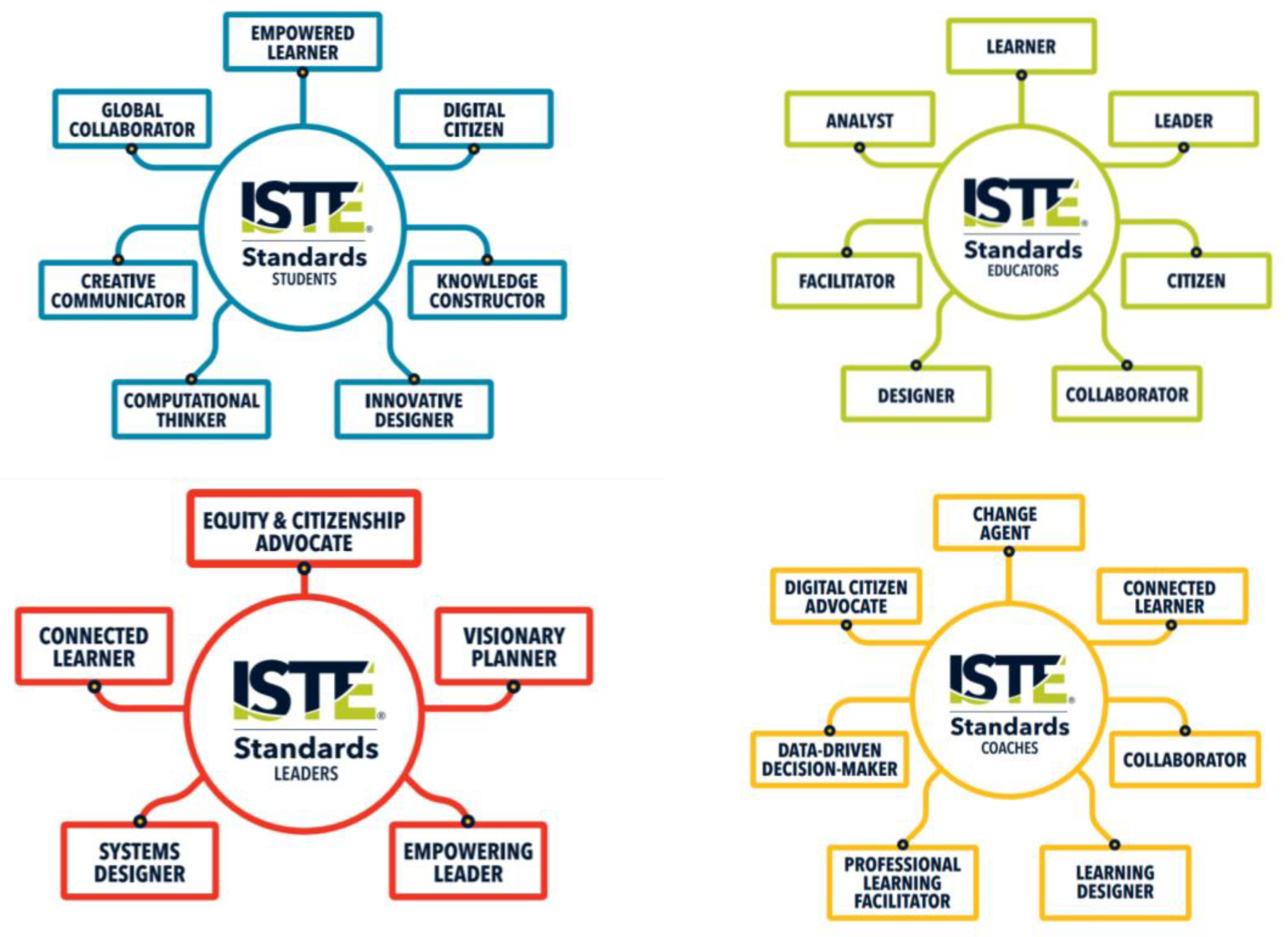
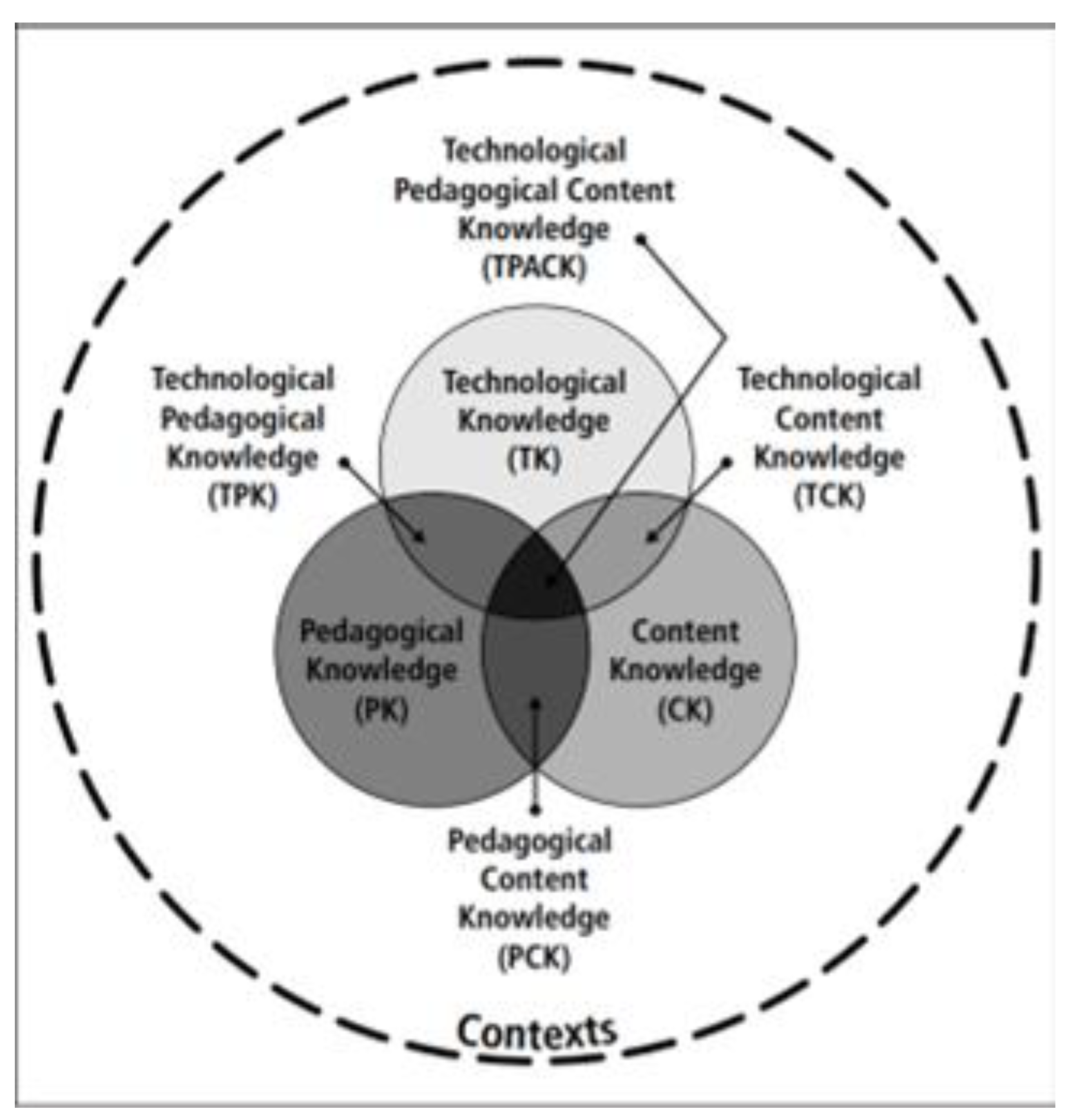
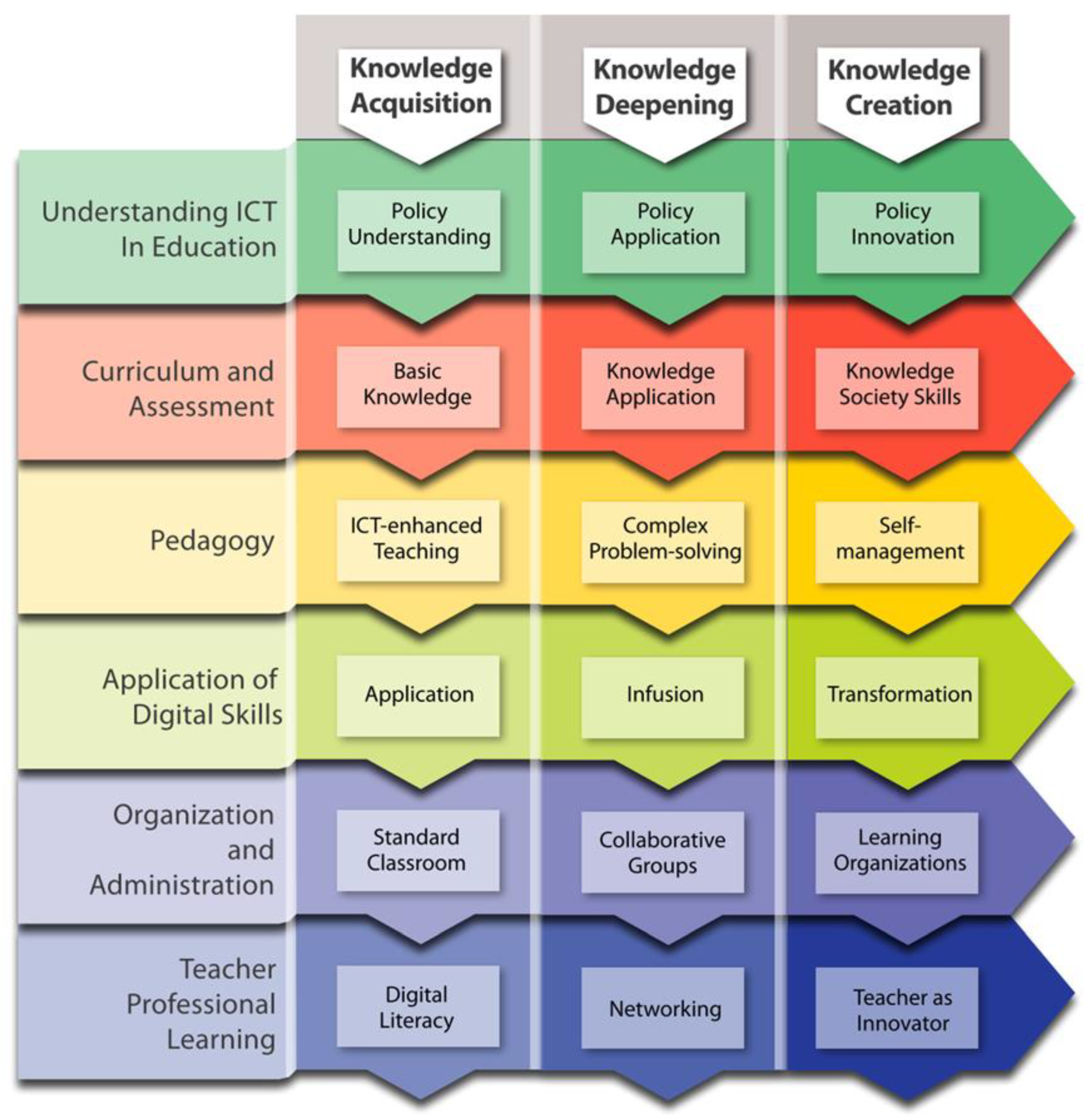


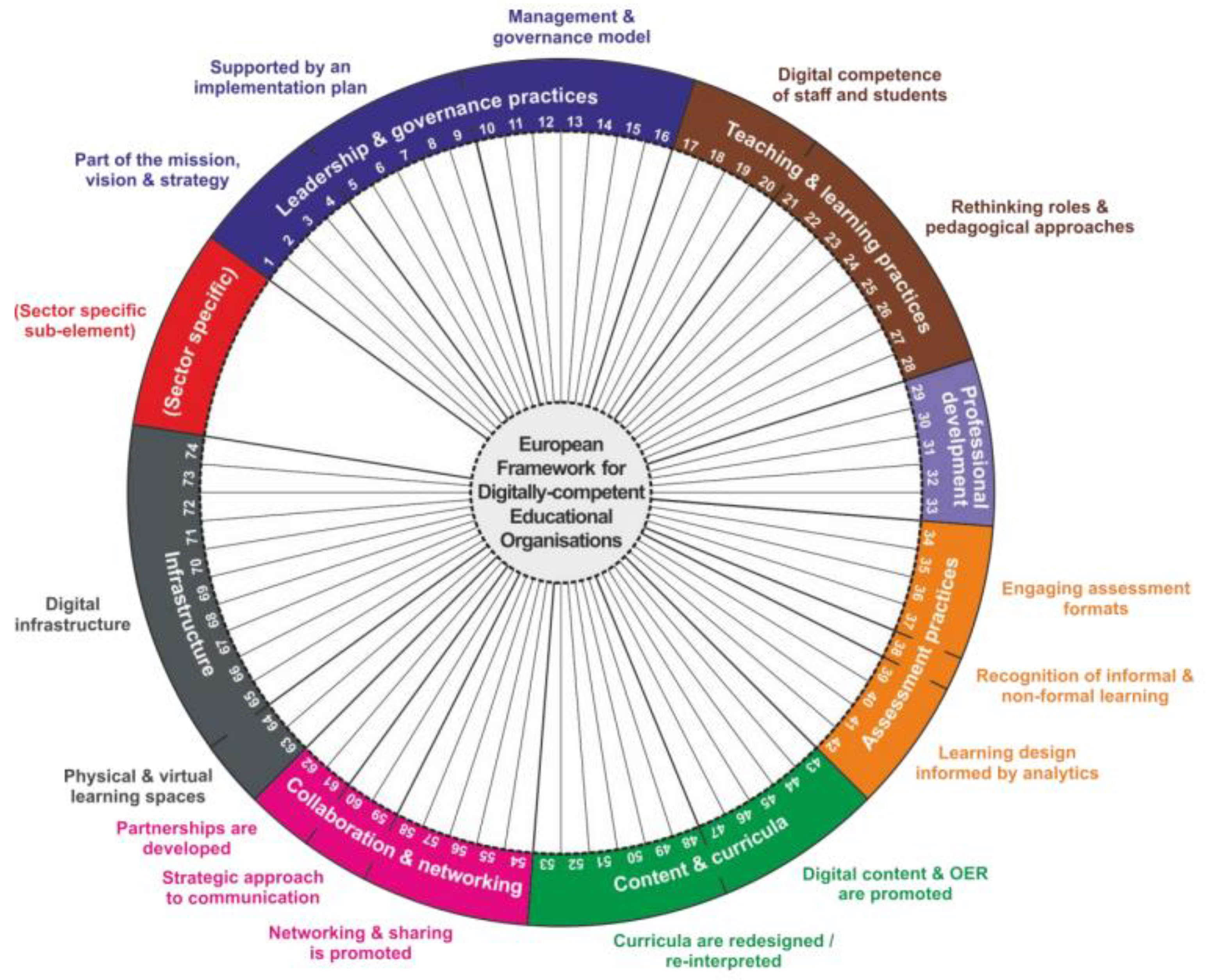

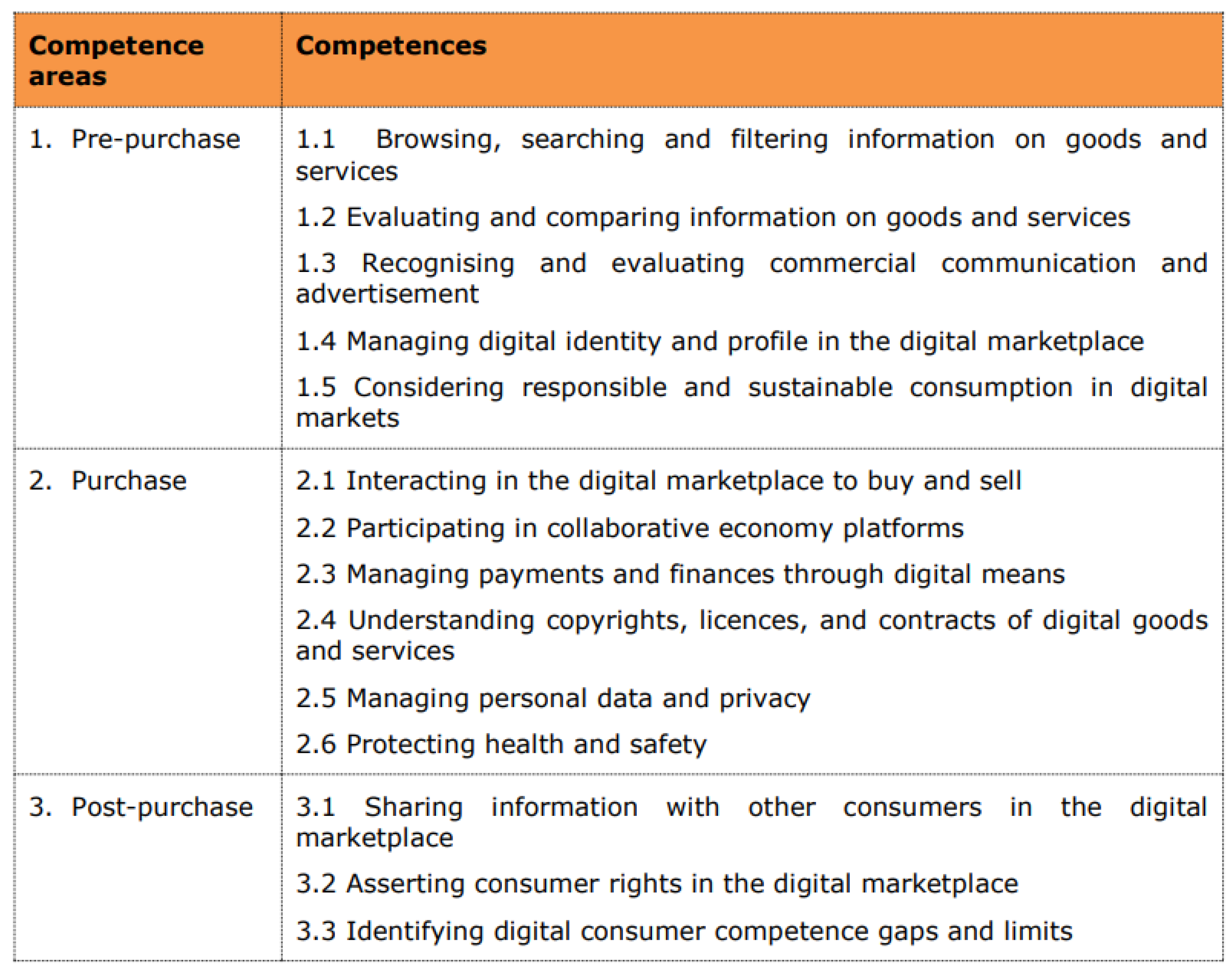
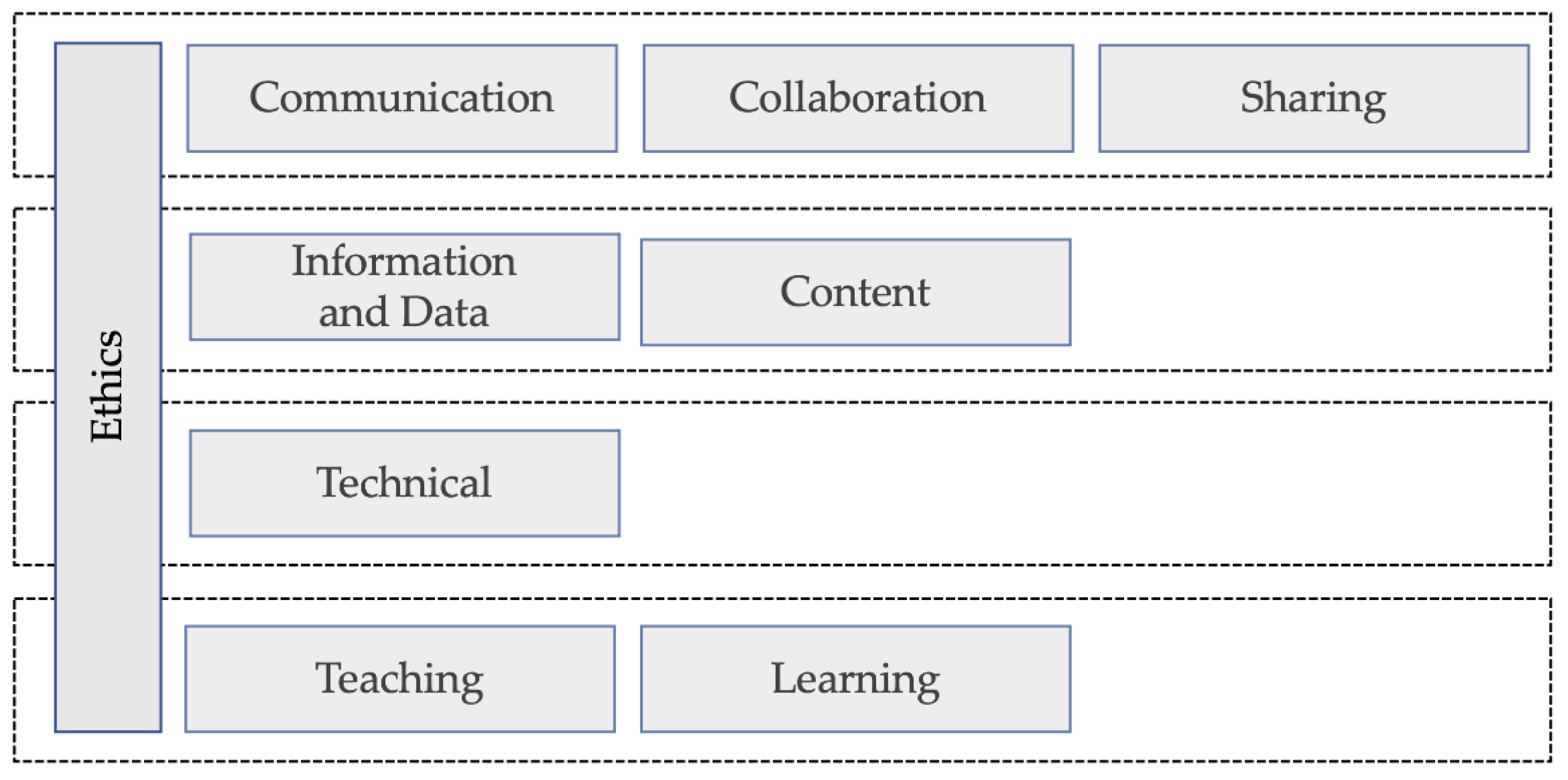
| Ref | Initials | Framework | Date | Pages | Authorship | Scope | Target |
|---|---|---|---|---|---|---|---|
| [15] | ISTE | ISTE Standards | 2021 | 13 | ISTE | International | Students, Educators, Educational Leaders, and Coaches |
| [16,17,18,19] | TPACK | Technological Pedagogical Content Knowledge | 2006, 2008, 2009, 2013 | 77 (38 + 16 + 16 + 7) | Mishra, Koehler, & Cain | International | Teachers |
| [23] | ICT CFT | UNESCO ICT Competency Framework for Teachers | 2018 | 68 | UNESCO | International | Teachers |
| [24] | DigCompEdu | European Framework for the Digital Competence of Educators | 2017 | 95 | JRC | Regional (EU) | Educators |
| [20] | DigCompOrg | European Framework for Digitally Competent Educational Organisations | 2015 | 77 | JRC | Regional (EU) | Educational Organizations |
| [27] | DigComp 2.2 | Digital Competence Framework for Citizens | 2022 | 134 | JRC | Regional (EU) | Citizens |
| [4] | DLGF | Global Framework of Reference on Digital Literacy Skills for Indicator 4.4.2 | 2018 | 146 | UNESCO | International | Citizens |
| [21] | DigCompConsumers | Digital Competence Framework for Consumers | 2016 | 35 | JRC | Regional (EU) | Consumers |
Publisher’s Note: MDPI stays neutral with regard to jurisdictional claims in published maps and institutional affiliations. |
© 2022 by the authors. Licensee MDPI, Basel, Switzerland. This article is an open access article distributed under the terms and conditions of the Creative Commons Attribution (CC BY) license (https://creativecommons.org/licenses/by/4.0/).
Share and Cite
Mattar, J.; Santos, C.C.; Cuque, L.M. Analysis and Comparison of International Digital Competence Frameworks for Education. Educ. Sci. 2022, 12, 932. https://doi.org/10.3390/educsci12120932
Mattar J, Santos CC, Cuque LM. Analysis and Comparison of International Digital Competence Frameworks for Education. Education Sciences. 2022; 12(12):932. https://doi.org/10.3390/educsci12120932
Chicago/Turabian StyleMattar, Joao, Cassio Cabral Santos, and Lucia Maria Cuque. 2022. "Analysis and Comparison of International Digital Competence Frameworks for Education" Education Sciences 12, no. 12: 932. https://doi.org/10.3390/educsci12120932
APA StyleMattar, J., Santos, C. C., & Cuque, L. M. (2022). Analysis and Comparison of International Digital Competence Frameworks for Education. Education Sciences, 12(12), 932. https://doi.org/10.3390/educsci12120932







